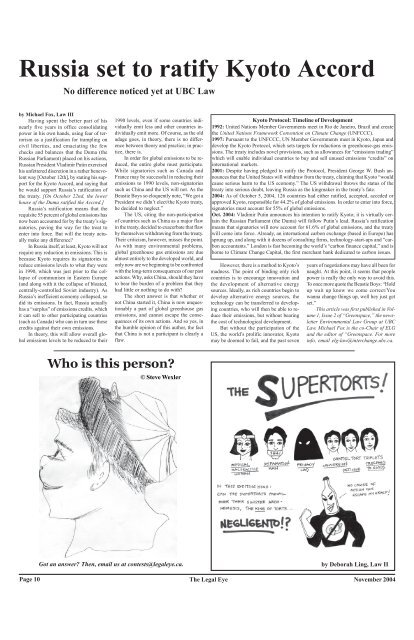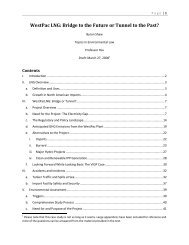The Legal Eye - Faculty.law.ubc.ca - University of British Columbia
The Legal Eye - Faculty.law.ubc.ca - University of British Columbia
The Legal Eye - Faculty.law.ubc.ca - University of British Columbia
You also want an ePaper? Increase the reach of your titles
YUMPU automatically turns print PDFs into web optimized ePapers that Google loves.
Russia set to ratify Kyoto Accord<br />
by Michael Fox, Law III<br />
Having spent the better part <strong>of</strong> his<br />
nearly five years in <strong>of</strong>fice consolidating<br />
power in his own hands, using fear <strong>of</strong> terrorism<br />
as a justifi<strong>ca</strong>tion for trampling on<br />
civil liberties, and emaciating the few<br />
checks and balances that the Duma (the<br />
Russian Parliament) placed on his actions,<br />
Russian President Vladimir Putin exercised<br />
his unfettered discretion in a rather benevolent<br />
way [October 12th], by stating his support<br />
for the Kyoto Accord, and saying that<br />
he would support Russia’s ratifi<strong>ca</strong>tion <strong>of</strong><br />
the treaty. [On October 22nd, the lower<br />
house <strong>of</strong> the Duma ratified the Accord.]<br />
Russia’s ratifi<strong>ca</strong>tion means that the<br />
requisite 55 percent <strong>of</strong> global emissions has<br />
now been accounted for by the treaty’s signatories,<br />
paving the way for the treat to<br />
enter into force. But will the treaty actually<br />
make any difference?<br />
In Russia itself, at least, Kyoto will not<br />
require any reduction in emissions. This is<br />
be<strong>ca</strong>use Kyoto requires its signatories to<br />
reduce emissions levels to what they were<br />
in 1990, which was just prior to the collapse<br />
<strong>of</strong> communism in Eastern Europe<br />
(and along with it the collapse <strong>of</strong> bloated,<br />
centrally-controlled Soviet industry). As<br />
Russia’s inefficient economy collapsed, so<br />
did its emissions. In fact, Russia actually<br />
has a “surplus” <strong>of</strong> emissions credits, which<br />
it <strong>ca</strong>n sell to other participating countries<br />
(such as Canada) who <strong>ca</strong>n in turn use these<br />
credits against their own emissions.<br />
In theory, this will allow overall global<br />
emissions levels to be reduced to their<br />
No difference noticed yet at UBC Law<br />
1990 levels, even if some countries individually<br />
emit less and other countries individually<br />
emit more. Of course, as the old<br />
adage goes, in theory, there is no difference<br />
between theory and practice; in practice,<br />
there is.<br />
In order for global emissions to be reduced,<br />
the entire globe must participate.<br />
While signatories such as Canada and<br />
France may be successful in reducing their<br />
emissions to 1990 levels, non-signatories<br />
such as China and the US will not. As the<br />
Beastie Boys so eloquently note, “We got a<br />
President we didn’t elect/the Kyoto treaty,<br />
he decided to neglect.”<br />
<strong>The</strong> US, citing the non-participation<br />
<strong>of</strong> countries such as China as a major f<strong>law</strong><br />
in the treaty, decided to exacerbate that f<strong>law</strong><br />
by themselves withdrawing from the treaty.<br />
<strong>The</strong>ir criticism, however, misses the point.<br />
As with many environmental problems,<br />
global greenhouse gas emissions are due<br />
almost entirely to the developed world, and<br />
only now are we beginning to be confronted<br />
with the long-term consequences <strong>of</strong> our past<br />
actions. Why, asks China, should they have<br />
to bear the burden <strong>of</strong> a problem that they<br />
had little or nothing to do with?<br />
<strong>The</strong> short answer is that whether or<br />
not China started it, China is now unquestionably<br />
a part <strong>of</strong> global greenhouse gas<br />
emissions, and <strong>ca</strong>nnot es<strong>ca</strong>pe the consequences<br />
<strong>of</strong> its own actions. And so yes, in<br />
the humble opinion <strong>of</strong> this author, the fact<br />
that China is not a participant is clearly a<br />
f<strong>law</strong>.<br />
Who is this person?<br />
© Steve Wexler<br />
Kyoto Protocol: Timeline <strong>of</strong> Development<br />
1992: United Nations Member Governments meet in Rio de Janeiro, Brazil and create<br />
the United Nations Framework Convention on Climate Change (UNFCCC).<br />
1997: Pursuant to the UNFCCC, UN Member Governments meet in Kyoto, Japan and<br />
develop the Kyoto Protocol, which sets targets for reductions in greenhouse-gas emissions.<br />
<strong>The</strong> treaty includes novel provisions, such as allowances for “emissions trading”<br />
which will enable individual countries to buy and sell unused emissions “credits” on<br />
international markets.<br />
2001: Despite having pledged to ratify the Protocol, President George W. Bush announces<br />
that the United States will withdraw from the treaty, claiming that Kyoto “would<br />
<strong>ca</strong>use serious harm to the US economy.” <strong>The</strong> US withdrawal throws the status <strong>of</strong> the<br />
treaty into serious doubt, leaving Russia as the kingmaker in the treaty’s fate.<br />
2004: As <strong>of</strong> October 5, 2004, 126 countries had either ratified, accepted, acceded or<br />
approved Kyoto, responsible for 44.2% <strong>of</strong> global emissions. In order to enter into force,<br />
signatories must account for 55% <strong>of</strong> global emissions.<br />
Oct. 2004: Vladimir Putin announces his intention to ratify Kyoto; it is virtually certain<br />
the Russian Parliament (the Duma) will follow Putin’s lead. Russia’s ratifi<strong>ca</strong>tion<br />
means that signatories will now account for 61.6% <strong>of</strong> global emissions, and the treaty<br />
will come into force. Already, an international <strong>ca</strong>rbon exchange (based in Europe) has<br />
sprung up, and along with it dozens <strong>of</strong> consulting firms, technology-start-ups and “<strong>ca</strong>rbon<br />
accountants.” London is fast becoming the world’s “<strong>ca</strong>rbon finance <strong>ca</strong>pital,” and is<br />
home to Climate Change Capital, the first merchant bank dedi<strong>ca</strong>ted to <strong>ca</strong>rbon issues.<br />
However, there is a method to Kyoto’s<br />
madness. <strong>The</strong> point <strong>of</strong> binding only rich<br />
countries is to encourage innovation and<br />
the development <strong>of</strong> alternative energy<br />
sources. Ideally, as rich countries begin to<br />
develop alternative energy sources, the<br />
technology <strong>ca</strong>n be transferred to developing<br />
countries, who will then be able to reduce<br />
their emissions, but without bearing<br />
the cost <strong>of</strong> technologi<strong>ca</strong>l development.<br />
But without the participation <strong>of</strong> the<br />
US, the world’s prolific innovator, Kyoto<br />
may be doomed to fail, and the past seven<br />
years <strong>of</strong> negotiations may have all been for<br />
naught. At this point, it seems that people<br />
power is really the only way to avoid this.<br />
To once more quote the Beastie Boys: “Hold<br />
up wait up know we come correct/You<br />
wanna change things up, well hey just get<br />
set.”<br />
This article was first published in Volume<br />
1, Issue 2 <strong>of</strong> “Greenspace,” the newsletter<br />
Environmental Law Group at UBC<br />
Law. Michael Fox is the co-Chair <strong>of</strong> ELG<br />
and the editor <strong>of</strong> “Greenspace. For more<br />
info, email elg-<strong>law</strong>@interchange.<strong>ubc</strong>.<strong>ca</strong>.<br />
Got an answer? <strong>The</strong>n, email us at contests@legaleye.<strong>ca</strong>. by Deborah Ling, Law II<br />
Page 10 <strong>The</strong> <strong>Legal</strong> <strong>Eye</strong> November 2004






![Case Rule Topic [1] Canadian Dyers Ass. Ltd. v. Burton (1920) 47 ...](https://img.yumpu.com/3777956/1/190x146/case-rule-topic-1-canadian-dyers-ass-ltd-v-burton-1920-47-.jpg?quality=85)